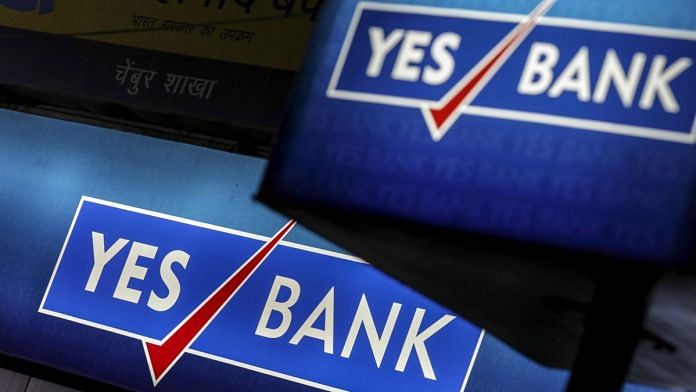New Delhi: In its nearly 16 years of existence, the board of troubled lender Yes Bank was headed by former IAS officers for nearly nine years, while a former Reserve Bank of India official was at the helm for a year.
Yet, the bank’s lending book expanded rapidly, unchecked and at a much higher rate than many of its peers.
The bank’s lending rose 19 per cent to Rs 2.41 lakh crore as of March 2019, from Rs 2 lakh crore in March 2018 — Managing Director and CEO Rana Kapoor stepped down in January 2019. Kapoor was arrested earlier this week on money laundering charges linked to loans given to Dewan Housing Finance and alleged kickbacks for some loans received by family members.
The previous years under Kapoor saw even higher advances growth, which was as high as 54 per cent in 2017-18, 35 per cent in 2016-17, 30 per cent in 2015-16 and 36 per cent in 2014-15. This has prompted many to question the efficiency of the board in flagging risky loans.
During this period, the overall credit growth in the banking industry averaged just around 9.3 per cent.
The bank’s lending book had grown at a more subdued 18 per cent in 2013-14, 24 per cent in 2012-13 and 11 per cent in 2011-12 but was preceded by a whopping 55 per cent growth in 2010-11 and 79 per cent growth in 2009-10. But at that time, the bank management had justified the growth citing its small base ever since it began operations in 2004.
There had, however, been warnings.
A 2015 report by global financial services firm UBS had pointed out the risks from the bank’s exposure to stressed companies, which was much higher compared to other state-run and private sector lenders.
“Yes Bank had the highest share of term loans backed by unlisted shares and current/movable assets (33 per cent),” the report had said.
It had added that loan approvals by Yes Bank to a list of around 100 potentially stressed companies put together by UBS was at 125 per cent of the bank’s net worth pointing out that this makes the bank more vulnerable to large corporate defaults. The bank at that time chose to complain against the firm to capital markets regulator Securities Exchange Board of India.
Also read: Everything you need to know about the Yes Bank collapse, rescue and prospects
IAS officers on bank’s board
Yes Bank’s co-founder Ashok Kapur headed the board from September 2004 to November 2008 as the non-executive chairman.
After his death, the board was headed by former IAS officer S.L. Kapur between January 2009 and April 2012. He was followed by M.R. Srinivasan, a retired career central banker who held the post for a year from 2013 to 2014. Radha Singh, a former IAS officer headed the board between October 2014 to October 2016. She was followed by career bureaucrats Ashok Chawla, who had a two-year term and Brahm Dutt — whose tenure was cut short when the RBI superseded the bank’s board last week.
“We have a feeling that a bank is run by a professional board. But the fact is that the boards are just figureheads. They do not play an effective role. If something wrong happens, independent directors put up their hands and say, ‘what can we do?’,” said J.N. Gupta, co-founder of Stakeholder Empowerment Services, a proxy advisory firm.
“Yes Bank’s book was growing faster than any bank. The independent directors should have asked why it was the case,” he added, further saying that independent directors on the board were all experienced professionals well placed to ask these questions.
Gupta also pointed out that some individuals hold board positions in multiple companies, thereby not discharging their duties effectively. “Eventually, investors invest money based on the reputation of the bank and the board and management that governs it,” he said.
However, two of the former chairpersons ThePrint spoke to defended their roles and said the board functions within limitations. Both did not wish to be identified.
“Yes Bank has always been a well-governed bank. I am surprised that things have come to this,” said the first former chairperson, adding that board meetings at the bank were always prolonged affairs starting at 10 in the morning and lasting for over eight hours.
He added that the board meeting was preceded by meetings of the sub committees like the audit committee on the previous day.
Loans above a particular threshold are approved by the board-level credit committee and loans below that threshold by a management-level credit committee, said the second former chairman.
“But the board-level committee’s decision to a large extent depends on how the management presents its case. If the management is inclined for a loan to be given, then all effort is made to convince the committee,” the person said, adding, “No board or committee will know about any side deals that are made by the top management as it appears to be the case with Yes Bank.”
Also read: How Yes Bank plunged into crisis: A timeline




Why was RBI a silent witness to this reckless over-expansion? Section 45 of the Banking Regulation Act was in existence in 2017 too. Why did RBI not act in 2017?
Ex-IAS officers are recruited/, appointed by private organisations only to manage the government. The only competency these ex- bureaucrats bring is their knowledge of the inner working of the government machinery. Neither are they competent bankers nor do they have any domain knowledge of banking. Expecting them to keep a watch on the bank’s operations is meaningless.